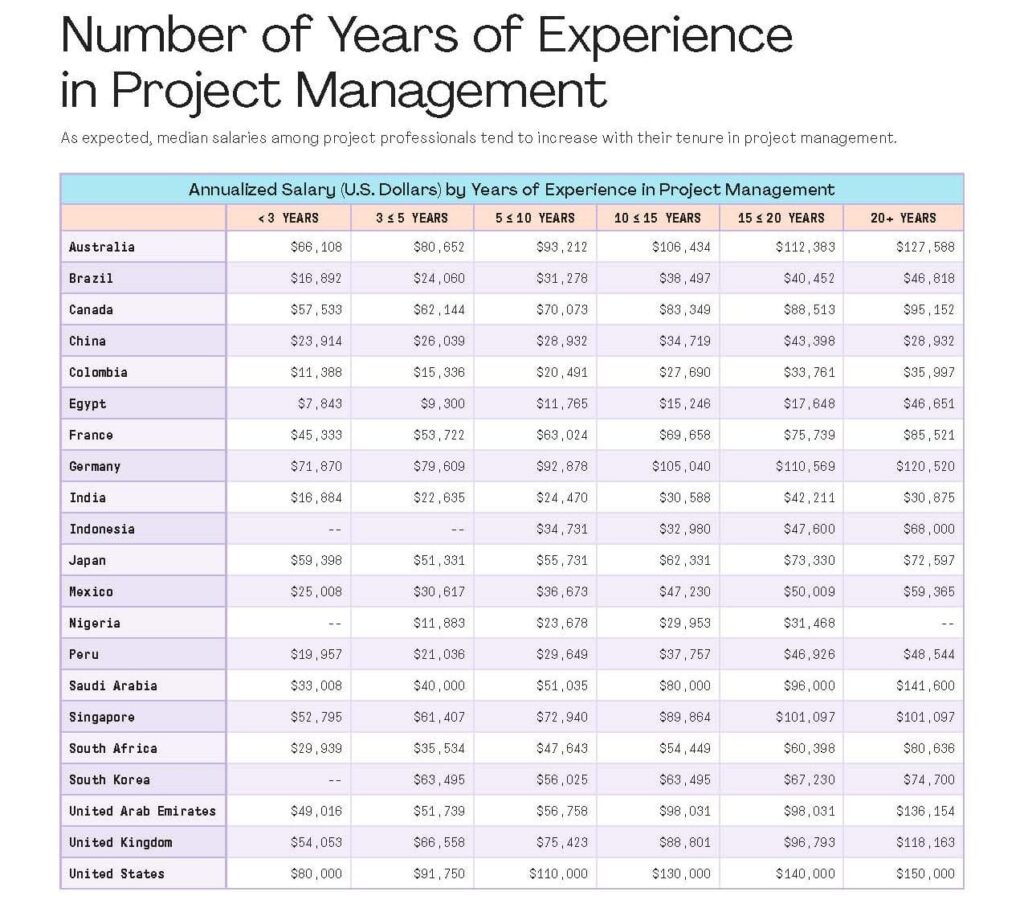
This weeks’ salary focus from Nicola Benjamin explores the latest findings on salary and progression. How best to identify the most lucrative project management niches and find the roles that offer the most returns for climbing the corporate ladder.
The project management sector continues to attract professionals globally with its unmatched flexibility in career prospects and competitive salaries.
The latest findings from the Project Management Institute’s (PMI) biennial salary report, underscore the financial advantages and career progression within this field.
The “Earning Power: Project Management Salary Survey – Thirteenth Edition,” draws on insights from over 20,000 respondents across 21 countries. This comprehensive survey provides invaluable data that can inform career decisions and development for project management practitioners at all levels.
The PMI report offers a compelling argument for considering a career in project management, particularly emphasizing the financial benefits associated with obtaining both certification and experience.
Notably, 78% of the survey respondents hold the Project Management Professional (PMP)® certification, a credential that correlates with significant salary advantages. On average, PMP® holders earn 33% more than their non-certified peers, a statistic that holds true across the 21 countries surveyed. This stark differential highlights the value of obtaining a PMP® certification as a strategic career move.
The data reveals a clear link between specifically the PMP® certification and salary growth. In countries such as South Africa and Colombia, PMP® holders report median salaries at least 65% higher than those without the certification. This trend suggests that the PMP® credential is not just a mark of professional competence but also a key driver of financial reward.
Moreover, the impact of the PMP® certification on salary growth is most pronounced in the early stages of one’s tenure. Newer PMP® holders experience substantial salary increases, underscoring the certification’s role in boosting early career earnings. This insight is particularly useful for aspiring project managers weighing the costs and benefits of certification.
It is likely that other formally accredited certifications are likely to similarly aid career progression and along with it salary inflation. However a more detailed analysis on the particular qualifications will be required to further shed light on their precise value-add.
The survey also highlights significant geographical variations in median salaries. Project professionals in the United States enjoy the highest median salary at $120,000, while their counterparts in Egypt report the lowest at $11,765. This disparity underscores the importance of considering regional economic conditions and industry standards when evaluating career opportunities in project management.
Within each country, factors such as years of experience, position level, and project size also influence salary levels. For instance, professionals managing larger projects with bigger teams and budgets generally command higher salaries. This correlation between project size and compensation suggests that gaining experience on more substantial projects can be a strategic career move.

Click to find out if your salary aligns to industry standards for your region
For current and aspiring project management professionals, the PMI report offers several strategic takeaways:
The PMI’s Salary Survey paints a promising picture for those in or considering a career in project management. With the right formal certification and experience, project managers can look forward to a rewarding career both financially and professionally.
For practitioners and organizations alike, maintaining focus on metrics such as salary and progression is a crucial tool in navigating the evolving landscape of project management salaries, ensuring that the profession continues to attract and retain top talent worldwide.
For a more indepth view of the findings, non-PMI members can access a summary of the survey here. And for more information on joining the PMI as a member head to its corporate page.
And from the PMG Career Whisperer find out how you maximize your take-home pay through effective salary negotiation.
Swanwick House, 22 Towcester Road, Old Stratford, Milton Keynes, MK19 6AQ, UK
© 2025 Project Management Global. All rights reserved | Privacy Policy